How to Be a True Outdoorsman: Hunting Tips, Using a Survival Knife and More
Oct 11th 2018
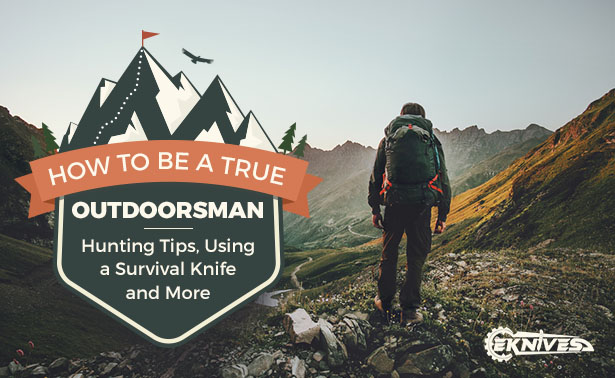
Becoming a true outdoorsman doesn’t just happen overnight. It’s the result of years of practice and intimate knowledge of yourself and your environment. It involves a lot of mistakes and some bumps and bruises along the way, but it also brings a lot of joy, confidence and lasting friendships into your life.
In this post, we’ll discuss how to make the outdoors a bigger part of your life, as well as some practical tips on hunting and the merits of survival knives and OTF knives. Here are some tips and guidelines to help get you there.
1. Build the outdoors into your life.
Making the outdoors a part of your lifestyle is the first step. Do this by taking what you love and putting it outside.
Are you Southern and permanently in love with Southern comfort food? Learn how to cook your favorite food over the fire for yourself and your buddies. Start by camping on the weekends and focus on relaxation, good food, beautiful hikes and great companions.
Did you love track and field or cross country as a kid? Try trail running in state parks near you. Do you love weightlifting and crushing it in the gym? Maybe give rock climbing a try. If you love getting in your own headspace and observing small details, start going on long walks, carry a plant guidebook and try writing down new plants or drawing them so you learn along the way.
Ultimately, the best way to build the outdoors into your life is to take the features of your life you enjoy most and put them in outdoor scenarios that you find enlightening and inspiring. This will naturally help you grow more in touch with your local environment and, by extension, more in touch with the wilderness.
2. Go on micro-adventures.
Becoming a true outdoorsman doesn’t only mean going on huge expeditions or epic hunting trips. It’s helpful and empowering to make small adventures a part of your life.
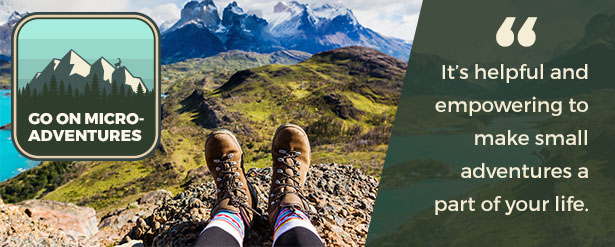
This idea has been explored and expounded upon by Alastair Humphreys, a Scottish adventurer, author and filmmaker. He calls it micro-adventuring. Basically, it’s the idea that finding an adventure that’s simple, short, cheap and local, but still inherently fun, challenging and confidence-building in an authentic way.
For example, Alastair is a big proponent of one-night weekday bivvy-camping trips.A bivvy is essentially a waterproof bag for outside your sleeping bag. It’s cheaper than a tent, more lightweight and can easily be carried in a small backpack or a bicycle saddlebag.
Camping and adventuring this way shows you just how many options there are for local adventure. It also steadily and organically builds skills and experience that will be incredibly useful in the long run.
3. Explore the outdoors with a friend.
This is perhaps the most important tip of all. Finding a friend on your level who cares about becoming an outdoorsman just as much as you do is a crucial part of your journey. This has many benefits. With a friend on your level, you can:
- Embarrass each other in the future at the bar with stories of past ineptitude. Like that time your friend forgot the tent pegs, again. Or the time that you thought Tinder on the trail was a good move—it wasn't.
- Challenge each other by continuously giving each other the next great bad idea, like micro-adventuring in the national forest when it was going to snow, you push each other to make up for the other person’s mistakes. This builds skills very quickly.
- Practice first aid together. Just practicing and not for real, of course. It’s always good to be prepared for what will, hopefully, never happen.
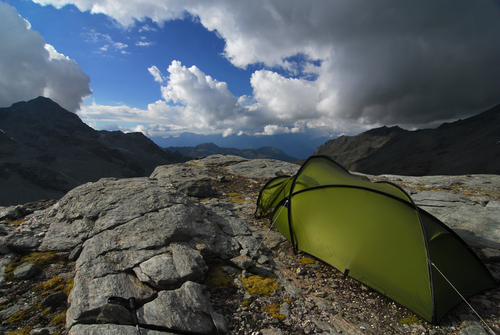
Having a friend who cares about the outdoors just as much as you do helps keep you safe, keeps you from adventuring alone and can help balance out your bold ideas. A friendship built in the outdoors can last a lifetime and a friend in the outdoors keeps you going back outside.
4. Get to know the old pros.
Find people who are older and/or know way more than you or your buddy. First, think about what it is exactly that you want to learn or should learn. If you’re new to the game, seek out non-profit companies that specialize in trips to help your city get outside. That way, you can get to know trip leaders, ask questions and experience something new.
However, if you already know, for example, that you want to get into multi-pitch rock climbing, start frequenting local gyms and talk to the old guys who’ve been doing it for a while. Hear anybody talking about that nasty crimp on the crux of the 5.12a? Those are probably your guys.
If you’re into trail running, join your local trail running Facebook group and take part in meetups. If you love hunting, go to the hunting stores in your area and make some friends. Talk to people who know and love what it is that you don’t know but already love. Invite them out for a beer.
5. Build hunting experience.
Hunting is an integral part of the outdoor experience. It’s not always for everyone, but having some knowledge is incredibly useful in an emergency scenario. However, it also has the following benefits:
- It forces you to slow down and pay attention. Hiking, running and climbing are all great, but they focus on moving through the landscape at a pace. Hunting asks you to sit still and watch.
- Paying attention means you get to know the landscape. Not only that, but you get to know the landscape in different hunting seasons. You get to know animal habits, animal signs and subtle cues and changes in the landscape.
- Getting to know the landscape keeps you safe. Regardless of your preferred activity, hunting uniquely and intimately acquaints you with the environment and the animals therein. This will greaten your enjoyment and your safety in other outdoor activities.
6. Learn about using different knives.
Knives are some of the most important outdoor tools you can possess. They are useful for self-defense, but that’s just the beginning. Here’s a sampling of possible emergency uses that have nothing to do with self-defense:
- Cutting dirty clothing away from wounds
- Cutting ropes or equipment entrapping a casualty
- Making an impromptu fishing spear
- Cutting paracord for hanging up tarps or hammocks or MacGyvering extra guy lines for your tent in high winds
- Very equally sharing the last of your favorite cheese with your friend
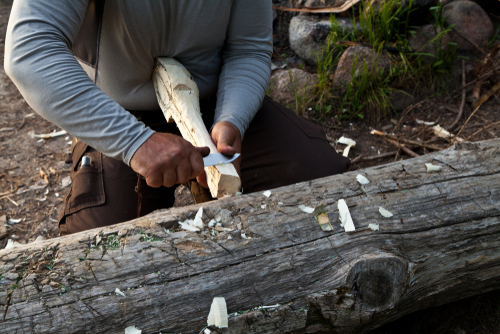
Some very useful knives include:
- Folding Knife
- A perfect knife for beginners or first-time users, it’s lightweight and can perform many basic functions.
- It fits into most pockets and is useful for smaller trips and micro-adventures.
- Custom Fixed Blade
- While not practical for carrying around every day, it’s an ideal survival knife.
- It is full tang, which means the blade extends into the handle—a root system, of sorts—which means it has no pivot point. This makes it much stronger.
- It’s much more practical for skinning game, prying things open, whittling or digging.
- If you’re going on longer trips or are purposefully trying to learn carving skills, for example, this is a good knife for you.
- Look for a good, ergonomic grip. eKnives has a range of fixed blade products that are made for safe use in survival scenarios.
7. Learn how to use a survival knife.
A survival knife, otherwise known as a tactical knife, is the next step up from a fixed blade and, as the name implies, is ideal for survival situations.
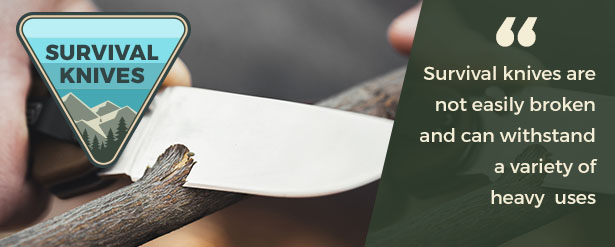
They serve many potential purposes as you become a true outdoorsman. Because they are made with a full, thick tang—which means the blade has a very thick base extending inside the handle—they’re not easily broken and can withstand a variety of heavy uses, including:
- Wood carving
- Trapping
- Woodcutting
- Skinning game after hunting
- Chopping wood or food
- Self-defense
They come in a variety of grip options, which make them easier and safer to hold. Some come with a cord wrapped around the handle, making them even easier to grip. Their strong tip makes self-defense much more effective and the combination of handle and tip strength means that you can fasten the knife to the end of a large stick to create a spear.
8. Practice making your own tools.
Using your knife, practice making tools and honing your skills. This will help you in hunting and survival scenarios. Here are some ideas:
- Make fishing hooks and practice using them.
- Practice whittling a spear.
- Get good at skinning game—watch videos before you practice!
- Set yourself new challenges, like carving a spoon, to keep your skills sharp.
9. Know how and when to build a fire.
This is one of the most essential outdoor skills of all. It’s crucial to practice this in a number of situations and to know where building a fire is appropriate—for example, the desert of California is an inappropriate place to build a massive bonfire. If your location is prone to wildfires, bring a lightweight camping stove and cook with fuel.
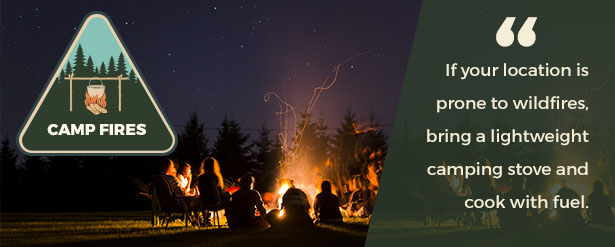
Regardless, a fire serves many purposes. If dealing with extreme cold or hypothermia, it can be lifesaving. It also provides you and your friends with a spot to potentially cook food and share stories. In short, knowing how and when to build a fire is integral to being a responsible outdoorsman.
Here are the basic principles of fire-making:
- Know if building a fire is appropriate.
- Secure your fuel source. If you anticipate wet weather, hang a tarp and store dry wood underneath it.
- Set up your fire ring. It’s always important to keep your fire contained, whether it’s in your state park campground metal fire ring, a small pit dug in the dirt or with a ring of stones.
- Start small. Start your fire on dry leaves and tiny sticks and then add larger sticks and logs.
- Maintain airflow. Stack your wood in such a way that the fire receives the oxygen it needs to burn.
- Never leave a fire unattended. Where there’s still smoke, there’s still fire. Wait until the fire burns down and stamp it out or throw water on the dying embers. There should be no smoke when you leave.
10. Get a Wilderness First Aid certification.
If you plan on spending a significant amount of time in the outdoors, this is essential to your safety. A Wilderness First Aid course’s first role is simple prevention. By knowing what injuries or ailments are most possible in certain situations, you have the knowledge and power to avoid those emergencies.
If you know, for example, that low blood sugar (hypoglycemia) can put someone at increased risk for hypothermia (lower body temperature) and that hypothermia can cause intense irrationality, then keeping every member of your group well-fed can prevent hypothermia, which then helps prevent a potential disaster. Preventing a fatality can be as simple as making sure everyone eats snacks and has dry feet.
If you have a friend who frequently ventures outdoors with you, ask them to join you on a course. That way, you have two trained first aiders and you can work to keep each other safe. This will be useful in any outdoor pursuit, but especially those that involve more inherent risks like climbing or hunting.
11. Explore new outdoor pursuits and new places.
Keep it fun and fresh. It’s fantastic to know the mountaineering scene in Montana, but a new challenge can teach you so much. Try hunting in Maine. Be a beginner again. Try a new sport—if you’re a hiker, try skiing. You never know what new adventure or passion lies around the corner. New skills from a new hunting environment will make you better on your home turf.
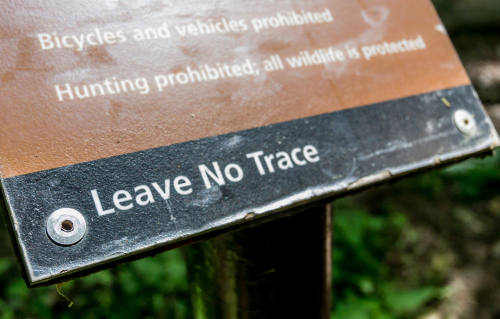
12. Leave no trace.
Finally, don’t be that guy. Nobody likes that guy. Follow Leave No Trace principles to leave the outdoors the way you found it for the next generation of hunters, climbers, hikers, runners and those of us who specialize in producing excellently embarrassing stories for the bar. Just as a reminder, here are the seven principles:
- Plan and prepare.
- Travel and camp on durable surfaces.
- Dispose of waste properly.
- Leave what you find.
- Minimize campfire impact.
- Respect wildlife.
- Be considerate of other visitors.
Conclusion
Above all, be safe, have fun, take a friend and make the outdoors an integral and permanent part of your life.
Last, make sure you have a survival knife. Call us at (423)-525-9477 with any questions you may have. That way, the next time you head to the bar with your adventure buddy, you can tell the glorious story of how you carved your own tent pegs in the rain—after your friend forgot the tent pegs yet again!

